|
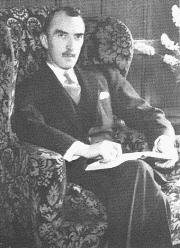 The life and works of Dornford
Yates
The life and works of Dornford
Yates
by G. A. Michael Sims -
A Book for all Reasons
Dornford Yates (real name Cecil William Mercer) was
born in 1885 at Walmer, Kent, the son of a solicitor,
and attended Harrow School and University College,
Oxford. His degree was not good enough to gain
traditional access to the bar, probably because he
spent a lot his time there involved with the Oxford
University Dramatic Society. His father used a little
known 'back door' to the bar and in 1908 he became a pupil to a
prominent solicitor, H. G. Muskett, who appeared on
behalf of the Police Commissioner. As his pupil, Yates
saw a great deal of the seedier side of London life at
Bow Street court.
Yates was called to the bar in 1909. As a junior
barrister he was not often overburdened with briefs and
for several years wrote short stories in his spare
time. His first known story appeared unattributed in
Punch in 1910 and he wasn’t given the credit until the
publication of the index to the half-year volume. From
1911 his stories were published in the popular Ward
Lock monthly ‘Windsor Magazine’ and a collection was
published in 1914 as his first book, ‘The Brother of
Daphne’.
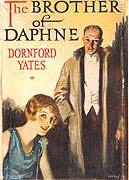 His output includes two distinct series of books, the
light and amusing ‘Berry’ books and the ‘Chandos’
thrillers as well as a number of non-series titles. His
main characters are drawn from the gentry class who
have the freedom to pursue leisure or villains
(depending on the genre) at will. His style of writing
is picturesque, a touch old fashioned perhaps using
some archaic forms but losing nothing by that as it is
still a pleasure to read well-written English.
His output includes two distinct series of books, the
light and amusing ‘Berry’ books and the ‘Chandos’
thrillers as well as a number of non-series titles. His
main characters are drawn from the gentry class who
have the freedom to pursue leisure or villains
(depending on the genre) at will. His style of writing
is picturesque, a touch old fashioned perhaps using
some archaic forms but losing nothing by that as it is
still a pleasure to read well-written English.
The general atmosphere created by Yates’s light fiction
is one where every day is summer and England is green,
peaceful and welcoming. His novels are populated by
'ladies' and 'gentlemen' who are worshipped by their
servants who, in turn, are regarded as part of the
family but a very definitely hierarchical family. The
class system, in which he was a sincere believer, is
very evident throughout all his books and a later
title, ‘Lower than Vermin’ (1950) regrets its passing
and yearns for older days.
Yates’s thrillers tend to grip from the outset. His
heroes are based in England but the main action
generally takes place in continental Europe. They will
rarely consider travelling without taking a pistol
although they have little need for passports. Their
cars have running boards, starting handles and a secret
compartment for the armoury. Right always prevails, the
natural order of things is eventually restored and
villains are ‘put-down’ without any qualms.
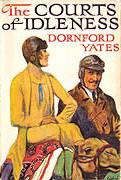 His second book, ‘The Courts of Idleness’ was published
in 1920, again a collection of short stories first
published in the Windsor magazine. In these stories he
had created the Pleydell family, the senior member
being ‘Berry’ and his next book, ‘Berry and Co.’, also
in 1920, further established the genre.
His second book, ‘The Courts of Idleness’ was published
in 1920, again a collection of short stories first
published in the Windsor magazine. In these stories he
had created the Pleydell family, the senior member
being ‘Berry’ and his next book, ‘Berry and Co.’, also
in 1920, further established the genre.
By this time he had moved to Pau in south-west France
and in 1921 came a change of tempo with ‘Anthony
Lyveden’, a gothic romance (as was the sequel ‘Valerie
French’ in 1923). 1922 saw a further ‘Berry’ book with
the publication of ‘Jonah and Co.’, followed by two
volumes of short stories, ‘And Five were Foolish’
(1924) and ‘As Other men Are’ (1925) and a fantasy,
‘The Stolen March’, in 1926.
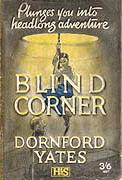 A further change of style came in 1927 with his first
‘Chandos’ thriller, ‘Blind Corner’, published by Hodder
and Stoughton. Hodder was to publish a further seven
titles including one cross-over genre, ‘Adele and Co.’
(1931) which is a ‘Berry’ book with thriller elements.
The publishing rights to these eight titles were later
bought by Ward Lock who reprinted them from 1943 under
their imprint using the original Hodder plates.
A further change of style came in 1927 with his first
‘Chandos’ thriller, ‘Blind Corner’, published by Hodder
and Stoughton. Hodder was to publish a further seven
titles including one cross-over genre, ‘Adele and Co.’
(1931) which is a ‘Berry’ book with thriller elements.
The publishing rights to these eight titles were later
bought by Ward Lock who reprinted them from 1943 under
their imprint using the original Hodder plates.
Yates has been criticised for his ‘anti-Semitic’ views
and even called a ‘Nazi’ by some. The basis appears to
be his use of apparently Jewish villains, especially in
his thrillers, but any author will use his experience
and observation on which to build his characters. At
the time of his pupilship with H. G. Muskett, a major
section of the criminal underworld appearing before the
court was of Jewish extraction, and so Yates was only
writing about what he knew. That the facts were
out-of-date was unfortunate but he was now resident
outside England and so rather out of touch with
contemporary crime.
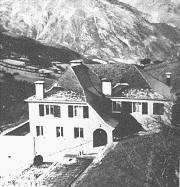 Eight more books appeared in the Ward Lock imprint
before 'The House that Berry Built'. It is based on the
real building project (right) he undertook at Eaux
Bonnes, near Pau, the house 'Gracedieu' of the book
being in reality called 'Cockade'. The house was
completed in 1939 but the war delayed publication of
the book until 1945. With the invasion of France in
1940 the Yates closed up the house and travelled to
Salisbury, Rhodesia. As the war drew to a close he
returned to ‘Cockade’ but was disappointed in both the
state of the house and the attitude of the French and
after some months he returned to Umtali, Rhodesia
where Yates was to spend the rest of his life.
Eight more books appeared in the Ward Lock imprint
before 'The House that Berry Built'. It is based on the
real building project (right) he undertook at Eaux
Bonnes, near Pau, the house 'Gracedieu' of the book
being in reality called 'Cockade'. The house was
completed in 1939 but the war delayed publication of
the book until 1945. With the invasion of France in
1940 the Yates closed up the house and travelled to
Salisbury, Rhodesia. As the war drew to a close he
returned to ‘Cockade’ but was disappointed in both the
state of the house and the attitude of the French and
after some months he returned to Umtali, Rhodesia
where Yates was to spend the rest of his life.
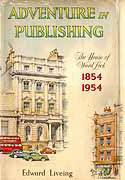 He continued writing and produced two further ‘Chandos’
thrillers, ‘Red in the Morning’ (1946) and ‘Cost Price’
(1949), a further ‘Berry’ book ‘The Berry Scene’
(1947), which filled in some of the gaps in previous
narratives, as well as two quasi-autobiographies and
three other novels. Dornford Yates was one of Ward
Lock’s most popular and successful novelists of the
first half of the 20th Century, to the extent that he
was invited to contribute the preface to Edward
Liveing’s history of the publishing house ‘Adventure in
Publishing’ (1954). He died in March, 1960 and was
buried in Umtali. He continued writing and produced two further ‘Chandos’
thrillers, ‘Red in the Morning’ (1946) and ‘Cost Price’
(1949), a further ‘Berry’ book ‘The Berry Scene’
(1947), which filled in some of the gaps in previous
narratives, as well as two quasi-autobiographies and
three other novels. Dornford Yates was one of Ward
Lock’s most popular and successful novelists of the
first half of the 20th Century, to the extent that he
was invited to contribute the preface to Edward
Liveing’s history of the publishing house ‘Adventure in
Publishing’ (1954). He died in March, 1960 and was
buried in Umtali.
Of Yates’s total output of 34 books ten were ‘Berry’
books, eight were in the ‘Chandos’ series (narrated by
Richard Chandos) and there were five non-Chandos
thrillers, although in 'Gale Warning' (1939) Chandos is
one of the characters but not the narrator. His books
are still collected and some editions are quite scarce.
The later uniform edition, published in the 1950’s with
armorial design dustjackets by Val Biro is a popular
way of gathering an almost complete set of his work as
only his final title did not appear in that edition.
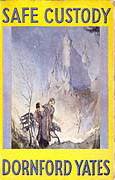 The earlier editions with pictorial dustjackets make a
more attractive collection. Very early copies used
artwork based on the original Windsor Magazine
illustrations but they are quite scarce. J.
Morton Sale produced
some ethereal illustrations
for the Hodder and Stoughton
titles and Ward Lock
dustjacket illustrators include van Abbé in the 1920’s
and J. F. Campbell in the 1930’s. Titles with these
jackets can still be found fairly easily although those
in very good condition will command a premium. The earlier editions with pictorial dustjackets make a
more attractive collection. Very early copies used
artwork based on the original Windsor Magazine
illustrations but they are quite scarce. J.
Morton Sale produced
some ethereal illustrations
for the Hodder and Stoughton
titles and Ward Lock
dustjacket illustrators include van Abbé in the 1920’s
and J. F. Campbell in the 1930’s. Titles with these
jackets can still be found fairly easily although those
in very good condition will command a premium.
For further reading, Richard Usborne wrote a comparison
of the works of Dornford Yates, 'Sapper' and John
Buchan in 'Clubland Heroes', published by Hutchinson
in 1953 and A. J. Smithers a biography of Dornford
Yates, published by Hodder and Stoughton in 1982.
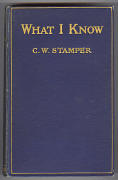 Postscript:
Postscript:
There is a further book associated with Dornford Yates.
'What I Know' by C. W. Stamper was published in 1913, a
volume of memoirs by the chauffeur/mechanic to Edward
VII, 1905-10. In the author's foreword there is note
of thanks to Dornford Yates, 'but for whose
tireless assistance these memories might never have
been written'.
The style of writing is very much in the Yates' vein
and it is assumed that he had ghost written the book.
A. J. Smithers, referring to Pau in his biography of Dornford
Yates states "exactly how he hit upon the place is not
clear" but visits to the French town
of Pau figure several times in these memoirs.
It may well be the answer that having
discovered this Yates
decided that anywhere good
enough for King Edward VII was probably good enough for him!
Dornford Yates - for a complete checklist of his
books
|

